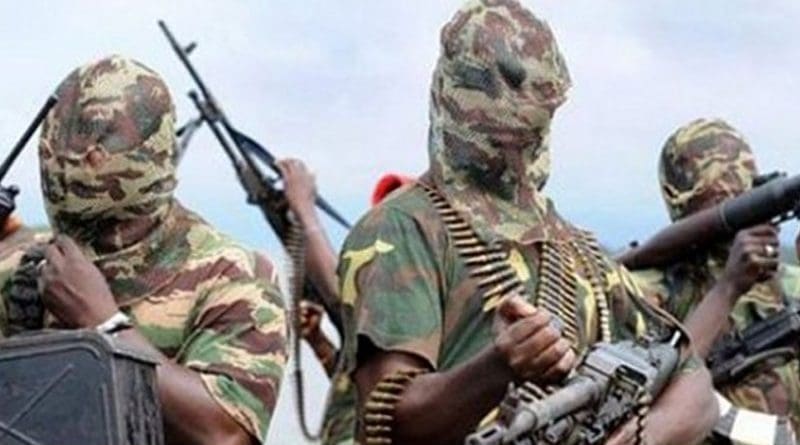Boko Haram Brings IEDs Back To Cameroon – Analysis
By ISS
By Célestin Delanga
Boko Haram’s return to using improvised explosive devices (IEDs) is a major worry for Cameroon’s Far North Region. Until recently, the region hadn’t recorded any major bomb attacks since 8 January 2021, when 15 people were killed in Mozogo. But on 21 March this year, a vehicle belonging to the Rapid Intervention Battalion was hit by an IED in Amchide. One soldier died and six were injured in the attack.
Just one month later, on 24 April, six members of the 42nd Motorised Infantry Battalion were killed when a mine activated by their vehicle exploded on the route linking Itéré, Bavongola and Tchébé Tchébé.
Earlier in the year, on 18 March, a grenade explosion in Djibrili left two people dead and one wounded. Between 18 March and 24 April, the Institute for Security Studies recorded at least six IED-related security incidents in Cameroon’s Far North. These ranged from attempted and successful explosions to infiltrations of suspected suicide bombers into communities.
Three factors may explain this resurgence in Boko Haram’s IED attacks – the counter-insurgency operations carried out by the Nigerian Army and the Multinational Joint Task Force (MNJTF), the recent elections in Nigeria, and clashes between the different factions of Boko Haram.
Regarding military operations, two in particular – Harbin Zuma, led by the MNJTF, and Desert Sanity, led by the Nigerian Army – are putting the violent extremists in a difficult position. The extremists are increasingly retaliating with IEDs. On 14 May, MNJTF troops were hit by a double IED attack as they advanced towards an Islamic State West Africa Province (ISWAP) camp in Tunbum Reza. Just two weeks earlier, on 29 April, Operation Desert Sanity troops recovered numerous IEDs intended to halt their advance in areas surrounding Ubaka in the Sambisa Forest.
In addition, the insurgents were said to be planning to disrupt Nigeria’s electoral processes on 25 February and 11 March. However, the Nigerian Army had been preparing to contain this threat, which made it difficult for the insurgents to operate in the country during this period. IEDs intended for attacks were detonated in Cameroon, which is easily accessible given its porous borders.
Moreover, since Boko Haram split into two factions in 2016, these rivals have violently fought against each other. Clashes began to intensify at the start of 2022, forcing them to retreat to their rear bases. For Jama’atu Ahlis Sunna Lidda’adati wal-Jihad (JAS), this was the Mandara Mountains on the border with Cameroon; for ISWAP, the town of Banki. The movement of these groups back towards Cameroon’s borders could explain the upsurge in IED attacks.
Mine-clearing skills are needed now more than ever among Nigeria’s defence and security forces
Most of the IEDs are believed to have been produced in Nigeria, where the defence and security forces have shut down and arrested alleged manufacturers several times. A former bomb maker from the JAS faction, who surrendered to the Nigerian authorities in August 2021, explained the extent of this activity in Boko Haram to Radio Ndarason. Insurgent attacks on military barracks also provide them access to combat equipment, including IEDs.
Government players are trying to adapt to this situation. On 23 March, the Prefect of Logone-et-Chari issued a letter to the sub-prefects under his command to warn them of suicide bombers. He instructed them to hold more awareness-raising meetings with civil society to call for greater vigilance among the public. The defence and security forces are carrying out sweeping operations. While these measures are welcome, they would benefit from being supplemented by systematic searches and local networking.
The fight against IEDs must be a critical part of the broader strategy to prevent violent extremism
Mine-clearing skills are needed now more than ever among the defence and security forces. As such, the mine-clearance units must strengthen their capacity in this area through additional training. They should also exchange information with their Nigerian counterparts, who are more experienced due to the counter-offensive operations they regularly carry out.
Intelligence and sweeping operations must be stepped up and sustained to deter bombers and their accomplices and to weaken the supply chain for the raw materials used to manufacture bombs. Vigilance committees also need to step up their intelligence and early warning efforts, and civil society organisations should include the threat of IEDs in their awareness-raising activities.
The fight against IEDs must be a critical part of the broader strategy to prevent and address violent extremism.
About the author: Célestin Delanga, Research Officer, ISS Regional Office for West Africa, the Sahel and the Lake Chad Basin
Source: This article was published by ISS Today

